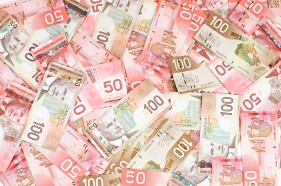The summit of the European Union nations last week set the mood for this week and it wasn’t the optimistic one. The Canadian dollar felt the weight of the negative sentiment, but the week wasn’t altogether bad for Canada’s currency.
The outcome of the summit disappointed market participants. The United Kingdom walked away from the discussions, the agreements are looking too far away in the future without addressing the immediate concerns, the plans should be ratified by all the countries that participated in the meeting and there are already signs of dissension among the politicians. The results of the meeting weren’t disastrous, but they were far from being good.
The Spanish debt auction improved the market sentiment, but the warning by Fitch ratings that France may lose its top credit rating spoiled the traders’ mood. All in all, Europe continued to inflict a downward pressure on the Canadian currency.
The influence of the United States was better, but only barely. The decision of the Federal Reserve not to embark on the next round of quantitative easing, at least for now, can be considered negative for the loonie as it strengthened the US dollar. The positive economic data, including the falling jobless claims, bolstered the market optimism, but the stalling inflation growth made another hit to the sentiment of speculators.
The Canadian dollar behaved in line with the forecast. The currency fell against the greenback and the yen, but advanced against the euro.
USD/CAD jumped from 1.0187 to 1.0377, while CAD/JPY dropped from 76.15 to 74.87 this week. EUR/CAD went down from 1.3632 to 1.3534, while AUD/CAD fell from 1.0401 to 1.0359 after touching the low of 1.0254 during the week.
If you have any questions, comments or opinions regarding the Canadian Dollar,
feel free to post them using the commentary form below.



Be First to Comment